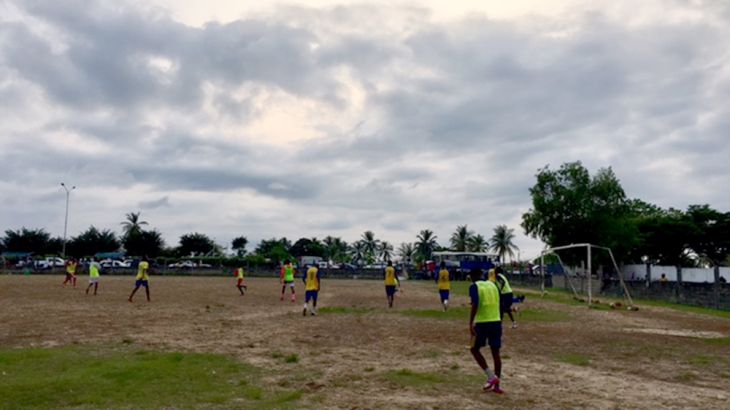AFCON: Football fails to bring relief to Gabon
The African Cup of Nations tournament was expected to bring relief after the post-election crisis in Gabon.

Libreville, Gabon – The 2017 Africa Cup of Nations, the continent’s biggest football tournament, is taking place in Gabon.
But across the country, there is a quiet unease in the background. Support for the tournament appears somewhat muted following last year’s fiercely contested presidential election and the country’s buckling economy.
Keep reading
list of 4 itemsMan City clinch historic fourth Premier League title despite Arsenal win
Arsenal, Man City: All you need to know about the EPL final day title fight
Arsenal vs Everton 2-1: Premier League final day – as it happened
Gabon is hugely reliant on revenue from petroleum and the expense of this tournament comes at a time when oil prices have been falling and many public-sector workers are on strike.
The disputed outcome of the 2016 election resulted in violence in which Libreville’s parliament building was set on fire.
|
|
That burned out shell stands as constant reminder of what happened just a few months ago. The incumbent Ali Bongo was eventually declared the winner, meaning his family has now been in charge of the country for half a century.
I spoke to a supporter of Bongo’s opponent Jean Ping. He told me new football stadiums funded by international loans are the last thing the country needs right now.
“The stadiums don’t help develop our economy,” Georges Mpaga told Al Jazeera.
“They were built by the Chinese who brought in their own workers. That doesn’t benefit the population. We should be investing in education, health and housing.”
Not surprisingly, organisers view the situation differently. They argue the event has allowed football facilities to be built in otherwise-neglected parts of the country and believe it can be a catalyst for national unity.
“The Gabon team belongs to all the people,” said Snella Pambot, spokesman for Gabon 2017.
“The players are selected on the basis of their talent, not their political preference or the region they’re from. They are ambassadors of the country.”
READ MORE: A week in post-election Gabon
Young Jeremie Kouamba has his sights set on being part of the national team. I find him kicking around with his friends on a small square of open land in Libreville.
He tells me the tournament is unlikely to make any difference to him and that his best chance of making it to a bigger stage will involve a move to Europe.
“In Gabon, it’s hard, its really hard to be among the champions,” he said. “You can play with clubs, but afterwards there isn’t anything. If you don’t make the first division, there’s nothing. But in Europe, you can join a club and live at ease with your family.”
One of the key complaints Kouamba and his friends have is the lack of decent practice fields.
A building site in the middle of the city makes you want to scream in frustration on their behalf. There were plans for the partially renovated Omnisport stadium to stage the opening and closing games of this tournament.
![Gabon's tournament got off to a poor start with a draw against Guinea-Bissau [Mike Hutchings/Reuters]](/wp-content/uploads/2017/01/e84d6ca7a275442f8fe364c89a51a0ae_18.jpeg)
In fact, it was pencilled in to play a role when Gabon co-hosted the 2012 event with Equatorial Guinea.
But for a second straight tournament, that stadium will stand only as a monument to missed deadlines. That’s despite more than $200m of government cash being spent on the project.
Elsewhere in the capital, there is an abandoned accommodation and training facility that was built for the 2012 tournament.
This was where the Zambia team stayed in the build up to their title win. When that competition finished, the facility briefly became the focal point of an academy for young players in Gabon.
Funding woes
Former Cameroon international Bill Tchato was one of the coaches. Two years ago, the public funding stopped and so too did the football.
“Many parents hope that their children can become professionals,” said Tchato, a veteran of Cameroon’s 2002 World Cup team.
“We find some children on the street, their parents have no money, but they still dream that one day their kid can make some cash and have a better life. That’s a dream that’s been broken with this academy closing.”
Jeremie may not have an academy to play at or a perfect pitch to play on, but he remains focused on hitting his career targets regardless. His aim is to start off with a club in France and then get a move to Real Madrid.
For the next few days he will be surrounded by some of the continent’s best players as the energy and excitement of Africa’s biggest sporting event unfolds.
But the tournament looks set to have little bearing on whether he one day makes it to a future Cup of Nations.
|
|